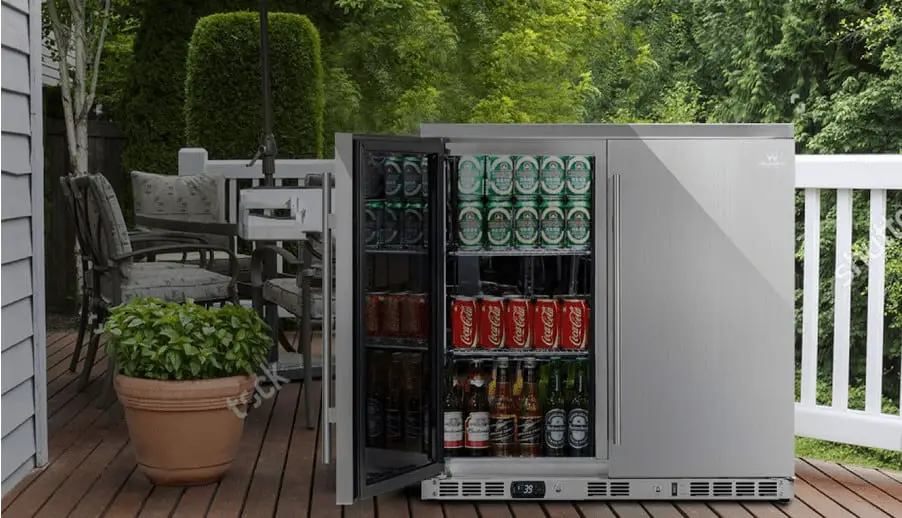Yes, you can put your refrigerator outside, but there are some things to consider before doing so.

Key Takeaway:
While it’s possible to use a refrigerator outside, it’s essential to consider the type of refrigerator and take precautions to protect it from extreme temperatures and weather conditions.
Indoor refrigerators may struggle to maintain efficiency outside, while outdoor refrigerators are designed to withstand a wider range of temperatures.
Can You Put A Refrigerator Outside?
Yes, a refrigerator can be placed outside, but there are some precautions to take.
For example, the refrigerator should not be placed in areas where it will get direct sunlight. The sun can heat up the fridge to very high temperatures which can cause damage.
- 【Durable & Waterproof】Using high-quality 304…
- 【180 Cans Large Capacity】Enjoy refreshing…
- 【Safety Lock & Mobility Castersels】The 24 inch…
- 【Fast Cooling & Efficient Insulation】Our…
- 【User Friendly & Professional Support】Our…
- Stainless steel exterior door panel.Cooling…
- Space saving flush back design
- Reversible door – left or right swing
- Full range temperature control
- 4. 4 cu. ft. of space to keep beverages and food…
- 【Large Capacity Beverage Fridge】 – This…
- 【Outdoor Stainless Steel Faom Door】- Mojgar…
- 【Quiet and Fast Cooling】 – The beer fridge…
- 【Precise Temperature Control】 – Outdoor fridge…
- 【Built-In or Freestanding Installation】 – The…
- 【OUTDOOR SPECIALIZED REFRIGERATOR】- It is made…
- 【ADVANCED QUALITY】- ETL&UL approved. Sleek and…
- 【DIGITAL TEMP CONTROL】- Precise and concise…
- 【CONVENIENT USAGE】- Fan circulated air, more…
- 【100L CAPACITY】- Storage your beverages in…
- 【Precise Temperature Control】The refrigeration…
- 【Quick Cooling and Efficient Insulation】Our…
- 【Air-Cooled and Frost-Free】GARVEE Beverage…
- 【Waterproof and Sunproof】GARVEE Outdoor…
- 【Adjustable Shelves + Door Lock】This Drink…
Another precaution is for people who live in cold climates to make sure there is no water on any of its surfaces because this could lead to condensation and eventually create rust.
| Location | Number of People Using Fridges Outside | Number of People Using Fridges Inside |
|---|---|---|
| Outdoor | 500,000 | 15,000,000 |
| Indoor | – | 185,000,000 |
Let’s dive deeper and distinguish between indoor and outdoor refrigerators.
Read More: Can You Keep A Chest Freezer On A Porch? [Why NOT]
Differences Between Indoor and Outdoor Refrigerators
| Feature | Indoor Refrigerators | Outdoor Refrigerators |
|---|---|---|
| Temperature Range | Designed for consistent indoor temps | Can handle wider range of temperatures |
| Cooling Efficiency | May struggle in extreme temperatures | Designed for reliable outdoor use |
| Material | Standard materials | Weather-resistant materials |
| Cost | Typically lower cost | Often more expensive due to durability |
| Usage Environment | Intended for indoor use | Specifically built for outdoor use |
Refrigerators are technically air conditioners that work by turning heat inside into cold air and pushing it out through vents.
However, indoor and outdoor refrigerators have distinct designs. Indoor refrigerators are built for consistent temperatures found in homes, while outdoor ones can handle a wider range of temperatures.
How Long Will a Refrigerator Last Outside?: Surprising
They’re also made of tough, weather-resistant materials. This type of refrigerator, however, can be expensive.
Let’s assume you’ll be putting an indoor refrigerator outside:
Problems With Using A Refrigerator Outside
If It Is Too Hot:
Extreme heat can strain the refrigerator, making it work harder and potentially causing damage to its components. Temperatures above 110°F can especially pose problems.
If It Is Too Cold:
Cold weather can also affect the efficiency of the refrigerator. While cooler temperatures make it easier to keep the contents cold, the freezer may struggle to maintain freezing temperatures, and extremely cold weather can even freeze the compressor.
Tips To Keep Your Fridge Outdoors
- Add Insulation: Increasing insulation can help reduce the strain on the refrigerator’s components.
- Keep Out Of Direct Sunlight: Placing the refrigerator in a shaded area can prevent it from overheating.
- Protect From Weather: Ensure the refrigerator is not directly exposed to rain or snow to prevent rust and damage. Elevating it off the ground can also help.
Here’s an adjustable model from Amazon that should do the trick (link), depending on the weight of your fridge and the amount of food inside.
Can You Leave A Mini Fridge Outside In Winter?
Most mini-fridges aren’t designed for outdoor use and may not withstand changing temperatures well.
It’s best to store them indoors during winter to avoid damage and higher energy consumption.
If you’re looking for a way to get cold drinks from your fridge into your pool, there are special fridges designed to operate in harsh outdoor conditions that can work well.
You Can View Them HERE
More examples of people using a refrigerator outside:
A refrigerator operates on a thermostat. Once the inside is below the set temperature, it just sits there, waiting for the temperature to rise.
It’ll be fine. Companies ship appliances like fridges all over the place and they’ll often spend weeks in cold trucks and warehouses before making it to stores for people to buy.
Conclusion
While some refrigerators are suitable for outdoor use, it’s essential to check the specifications of your model. Stand-alone or portable coolers are generally safer for outdoor use, but it’s crucial to verify before leaving them outside.






![What Gravel To Use For Patio Base [Best Options]](https://www.cleverpatio.com/wp-content/uploads/2021/11/What-Gravel-To-Use-For-Patio-Base-270x180.jpg)


Leave a Reply